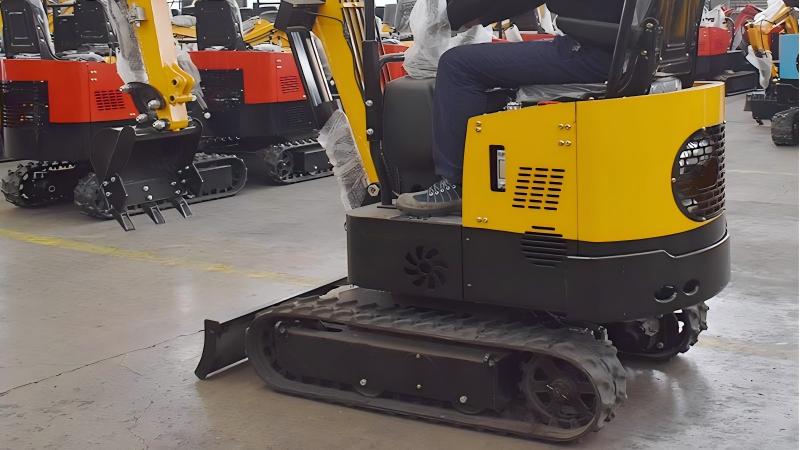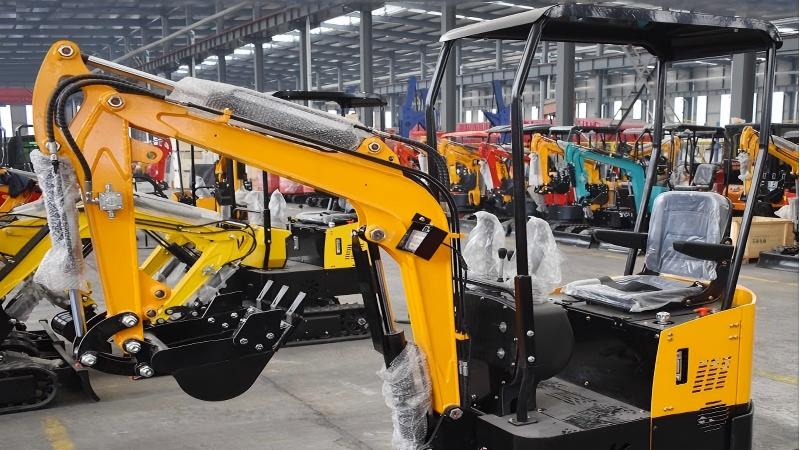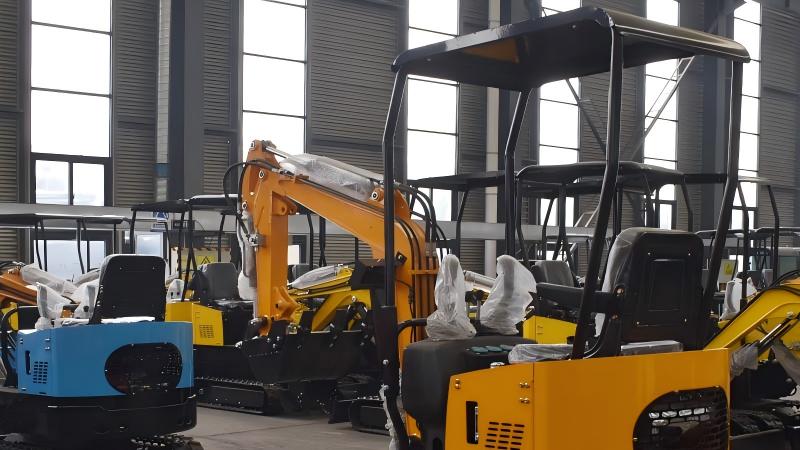Mini excavators have become indispensable tools for a wide range of tasks, from landscaping and plumbing to general construction and utility work. Their compact size and versatility make them ideal for navigating confined spaces where larger equipment simply cannot go. However, for individuals and businesses looking to acquire one, a primary concern is undoubtedly the cost. This article will delve into the average cost of mini excavators, exploring the factors that influence pricing, the difference between new and used models, and additional expenses to consider.
What is a Mini Excavator?
A mini excavator, also known as a compact excavator or mini digger, is a tracked or wheeled heavy equipment machine weighing under 6 metric tons (approximately 13,000 lbs). While their precise weight classification can vary by manufacturer, they typically range from 1 to 6 tons. They feature a boom, dipper (or stick), bucket, and a cab, all mounted on a rotating platform. This design allows for 360-degree rotation, enabling them to dig, lift, and move materials efficiently in tight quarters.
Average Cost of New Mini Excavators
The price of a brand-new mini excavator can vary significantly based on several factors, but a general range for new models in the United States is $30,000 to $100,000. More advanced, feature-rich models, or those from premium brands, can exceed this range.
To provide a more detailed breakdown, here's an approximate cost range based on weight class:
1-Ton Mini Excavators: These are the smallest and most compact models, ideal for light-duty landscaping, plumbing, or DIY projects. Prices typically range from $20,000 to $30,000.
2-Ton Mini Excavators: Offering a balance between compactness and power, these are popular for trenching, foundation work, and general construction. Expect to pay between $25,000 and $35,000.
2.7-Ton Mini Excavators: These versatile machines provide more power for a wider range of tasks and are often used for medium-sized projects. Costs generally fall within $30,000 to $45,000.
3.5-Ton Mini Excavators: At the higher end of the "mini" spectrum, these are capable of more serious excavation and landscaping projects. Prices can range from $35,000 to $60,000.
5-6 Ton Mini Excavators: These larger mini excavators offer significant power and reach, nearing the capabilities of small full-sized excavators. Prices for these models can range from $85,000 to over $100,000.
Average Cost of Used Mini Excavators
Purchasing a used mini excavator can offer substantial savings, making them an attractive option for budget-conscious buyers or those with less frequent usage needs. The cost of a used mini excavator can vary widely, but typically ranges from $10,000 to $75,000.
Key factors influencing used prices include:
Age and Hours of Operation: Newer machines with fewer operating hours will command higher prices.
Brand and Model: Reputable brands tend to hold their value better.
Condition: The overall mechanical and cosmetic condition, including the engine, hydraulics, undercarriage, and cab, significantly impacts the price.
Maintenance History: A well-documented maintenance history can add value to a used machine.
Location and Market Demand: Prices can fluctuate based on regional market conditions and demand.
As a general guideline for used mini excavators:
8+ years old: Expect prices from $10,000 to $30,000. These machines may require more immediate maintenance or repairs.
4-7 years old: Prices typically range from $15,000 to $50,000.
1-3 years old: These newer used models can cost between $20,000 and $75,000, offering a good balance of modern features and lower depreciation.
Factors Influencing Mini Excavator Cost
Beyond the new vs. used distinction and weight class, several other factors contribute to the final price of a mini excavator:
Brand and Manufacturer Reputation:
Premium Brands: Companies like Caterpillar (Cat), Kubota, Bobcat, Komatsu, and Yanmar are known for their reliability, durability, and advanced features. Their machines generally come with a higher price tag but often offer better resale value and stronger dealer support.
Mid-Range and Entry-Level Brands: Brands like Sany, Takeuchi, and Doosan often provide good value and competitive features at a more accessible price point.
Lesser-Known or Chinese Brands: Some newer or less established brands, particularly from China, may offer significantly lower prices (e.g., $15,000 to $45,000). While attractive on price, buyers should research their quality, parts availability, and long-term support.
Features and Technology:
Cab vs. Canopy: Machines with enclosed cabs offering climate control (AC/heat) and enhanced operator comfort will be more expensive than open canopy models.
Hydraulic Thumb: A hydraulic thumb attachment significantly increases versatility for grasping and moving materials, adding to the cost.
Quick Couplers: These allow for rapid attachment changes, a highly desirable feature that adds to the price.
Zero Tail Swing/Reduced Tail Swing: These designs are crucial for working in extremely confined spaces, and models with this feature often carry a premium.
Telematics and GPS Systems: Advanced technology for tracking machine performance, location, and maintenance needs can add several thousand dollars.
Auxiliary Hydraulics: The number of auxiliary hydraulic lines determines the range of attachments that can be used. More lines typically mean a higher cost.
Attachments:
The base price of a mini excavator usually includes a standard digging bucket. However, most jobs require additional attachments, which are sold separately and can significantly increase the overall investment.
Common attachments include:
Augers: For drilling holes ($3,000 - $7,000)
Hydraulic Breakers/Hammers: For breaking concrete or rock ($10,000 - $25,000)
Grapples: For handling brush, logs, or demolition debris ($4,000 - $12,000)
Compactors: For soil compaction ($5,000 - $10,000)
Various Buckets: Trenching, grading, and specialty buckets (hundreds to a few thousand dollars each).
Engine Type (Diesel vs. Electric):
While most mini excavators run on diesel, electric models are gaining popularity, especially in urban areas with strict emission regulations. Electric mini excavators, with their batteries and specialized motors, typically cost more (often exceeding $50,000 for compact models).
Dealer and Warranty:
Purchasing from an authorized dealer often includes a warranty, access to genuine parts, and dedicated service support, which can justify a higher upfront cost compared to private sellers.
Additional Costs to Consider
The purchase price is just one component of mini excavator ownership. Buyers should also budget for:
Financing Costs: Interest on loans if the machine is financed.
Transportation: Moving the excavator from the dealer or seller to your job site can incur costs (e.g., $150 - $300 per move for mini excavators).
Insurance: Protecting your investment from damage, theft, or liability.
Maintenance and Repairs: Regular servicing (oil changes, filter replacements, track inspections) and potential major repairs (undercarriage rebuilds, engine overhauls, hydraulic pump replacements) can add up. Annual maintenance can be 2-5% of the machine's value, with major repairs costing significantly more.
Fuel: An ongoing operational cost, with mini excavators typically consuming 0.5 to 1.5 gallons per hour.
Operator Wages: If you're hiring an operator, factor in their hourly rate, which can range from $15 to $40 per hour.
Storage: If you don't have suitable on-site storage, you may incur rental fees for a secure location.
Licensing and Permits: Depending on your location and how the excavator is used or transported, you may need specific licenses or permits.
Conclusion
The average cost of a mini excavator varies significantly, from $10,000 for an older used model to over $100,000 for a new, top-of-the-line machine with advanced features and attachments. Understanding the factors that influence these prices – including size, brand, features, and condition (new vs. used) – is crucial for making an informed purchasing decision. Beyond the initial purchase, prospective owners must also consider ongoing operational costs like fuel, maintenance, insurance, and transportation. By carefully evaluating their needs, budget, and the available options, buyers can select a mini excavator that offers the best value and performance for their specific applications.
Post time:Sep-25-2020



